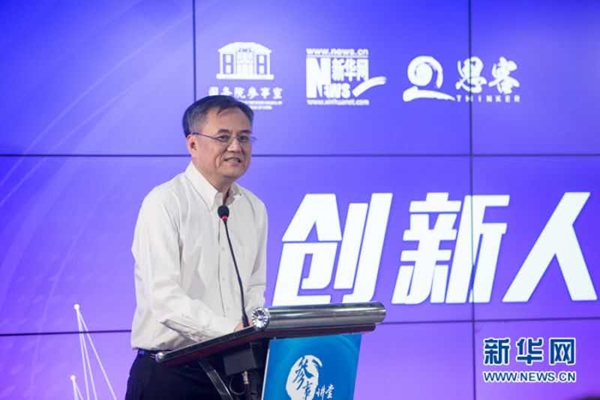Scholar: Chinese innovative talent education should go beyond knowledge
china.org.cn / chinagate.cn by Zhang Jiaqi, June 12, 2017 Adjust font size:
Innovative talent education in China should look beyond mere knowledge accumulation, and protect curiosity and imagination and cultivate sound values in students, said Qian Yingyi, counsellor of China’s State Council in Beijing on June 9.
|
|
|
Qian Yingyi, counsellor of China’s State Council and also dean of School of Economics and Management at Tsinghua University, delivers a lecture on innovative talent education in Beijing on June 9. [Photo/Xinhua] |
In a lecture, Qian, who is also the dean of School of Economics and Management at Tsinghua University, said the innovation-driven development of a nation requires innovative talents with creative thinking, with this quality dependent not only on knowledge but also curiosity and imagination.
Qian’s remarks came in the wake of China’s annual national entrance exam, in which a record 9.4 million students took part this time,
He said that, though China is the most populous country in the world and educates the world’s largest number of students, its achievements in science and technology, arts and humanities, new products, brands and business model remain scanty.
“Why is there the shortage of innovative talents under our education system?” Qian reiterated the question which was once raised by Qian Xuesen, Father of the Chinese missile program, 25 years ago. The answer was that the education of innovative talents required an innovative approach of its own.
He highlighted several critical factors - curiosity, imagination and sound values for future educational reform to reflect on.
In his view, the notion “knowledge is power” seems to prevail however, education does not equal knowledge. He quoted a few sentences from the world-renowned physicist Albert Einstein, to highlight the factors that he thought should be valued in education reform, namely: “I have no special talents. I am only passionately curious” and “imagination is more important than knowledge’. He Illustrated the thought in a formula “creativity = curiosity /imagination * knowledge.” Qian said knowledge invariably accumulates with time, but it is not the same case when it comes to curiosity and imagination, which depend more on the educational environment and methods.
The curiosity and imagination so intense during childhood may fade away with time or under pressure, especially under exam-oriented education, so student curiosity and imagination should be protected to become innovative talents, he stressed.
In the lecture, Qian also emphasized the cultivation and guidance of sound values in students under innovative talent education. He said that innovative education should guide students to have a “purpose” and even a “higher purpose” to overcome any anxiety about achieving quick success and gaining instant benefits.
Only by educating students to uphold sound values can there be more innovations, and, indeed, more revolutionary innovations, he emphasized.
